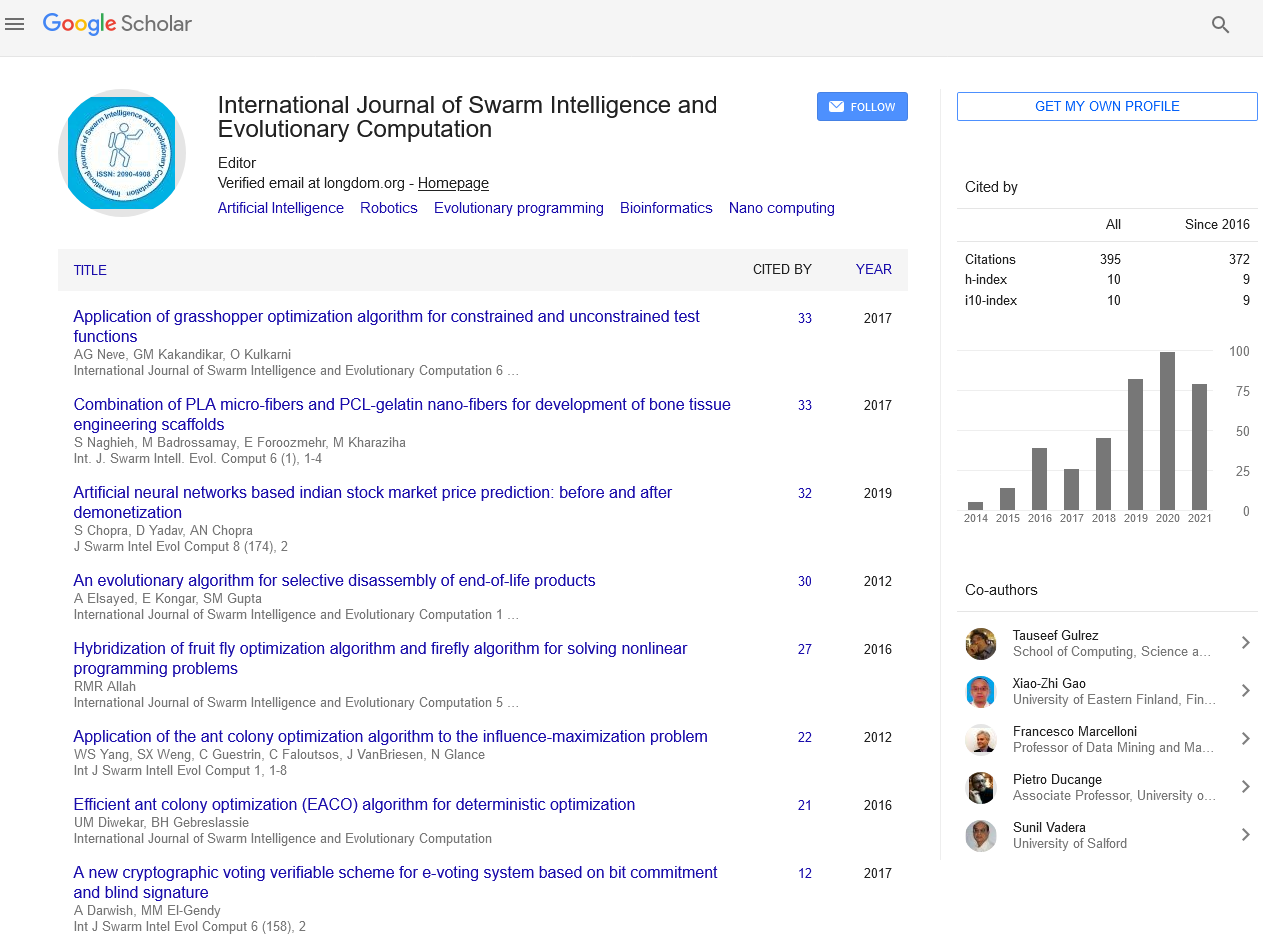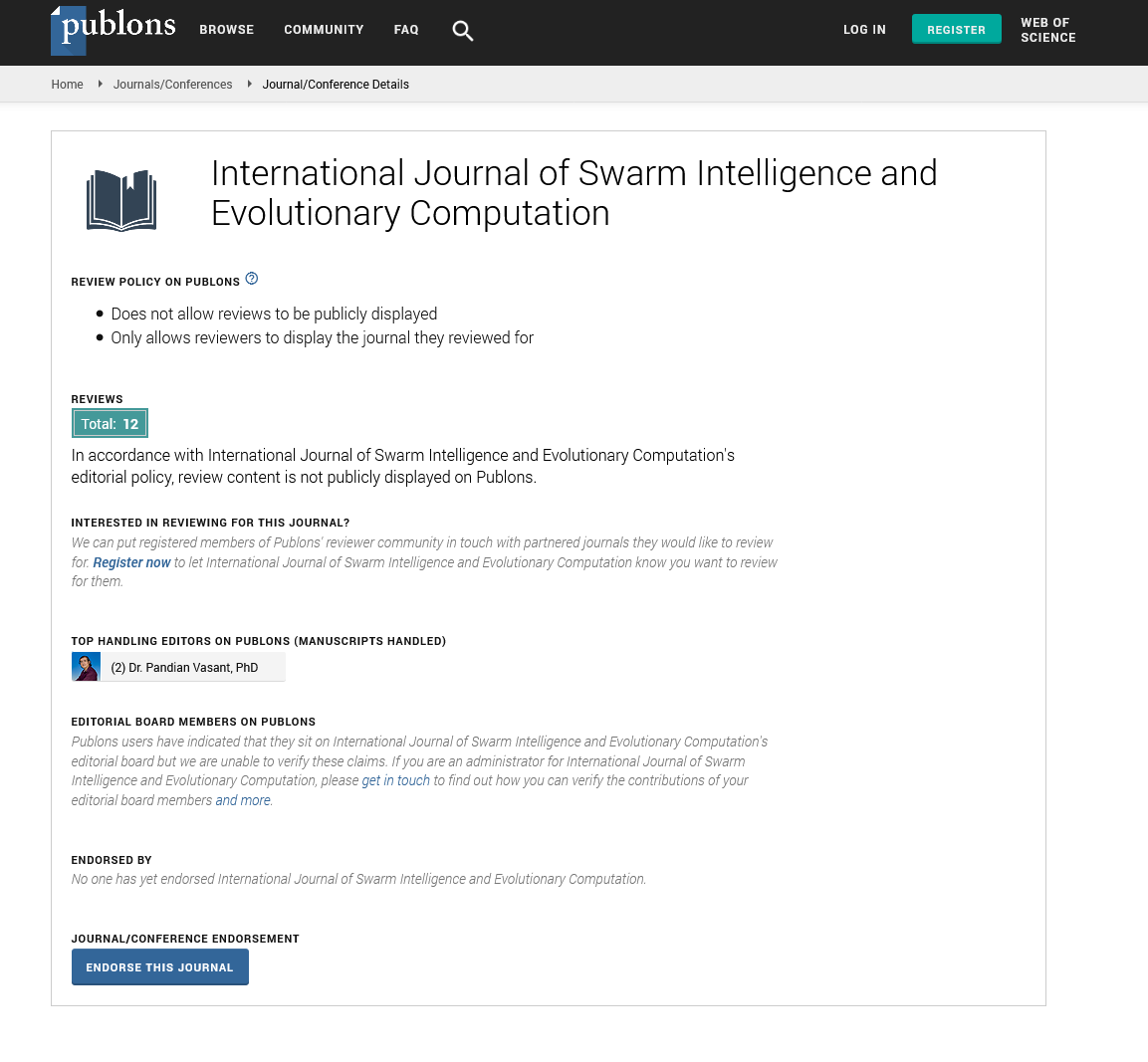Indexed In
- Genamics JournalSeek
- RefSeek
- Hamdard University
- EBSCO A-Z
- OCLC- WorldCat
- Publons
- Euro Pub
- Google Scholar
Useful Links
Share This Page
Journal Flyer

Open Access Journals
- Agri and Aquaculture
- Biochemistry
- Bioinformatics & Systems Biology
- Business & Management
- Chemistry
- Clinical Sciences
- Engineering
- Food & Nutrition
- General Science
- Genetics & Molecular Biology
- Immunology & Microbiology
- Medical Sciences
- Neuroscience & Psychology
- Nursing & Health Care
- Pharmaceutical Sciences
Opinion Article - (2023) Volume 12, Issue 1
Computational Intelligence and Hybrid Soft Computing for Big Data Analytics
Vivek Menon*Received: 02-Jan-2023, Manuscript No. SIEC-23-20393; Editor assigned: 04-Jan-2023, Pre QC No. SIEC-23-20393 (PQ); Reviewed: 18-Jan-2022, QC No. SIEC-23-20393; Revised: 26-Jan-2022, Manuscript No. SIEC-23-20393 (R); Published: 03-Feb-2023, DOI: 10.35248/2090-4908.23.12.300
Description
Hybrid soft computing refers to the integration of multiple soft computing techniques to solve complex problems. Soft computing techniques include fuzzy logic, neural networks, genetic algorithms, and swarm intelligence. The integration of these techniques can lead to more robust and efficient solutions for complex problems. Hybrid soft computing has been applied in various fields, including engineering, finance, and healthcare. In engineering, hybrid soft computing is used to optimize the design of complex systems such as aircraft, automobiles, and industrial processes. In finance, hybrid soft computing is used to predict stock prices and optimize investment portfolios. In healthcare, hybrid soft computing is used to diagnose diseases and develop treatment plans.
Techniques for hybrid soft computing
There are several techniques for integrating soft computing techniques, including:
Fuzzy neural networks: In this technique, fuzzy logic and neural networks are combined to create a more robust and efficient system. Fuzzy logic is used to handle uncertainty and imprecision, while neural networks are used for pattern recognition and learning.
Neuro fuzzy systems: In this technique, neural networks and fuzzy logic are combined to create a system that can handle both numerical and linguistic information. The system can handle uncertainty and imprecision and can learn from data.
Genetic fuzzy systems: In this technique, genetic algorithms and fuzzy logic are combined to create a system that can optimize complex problems. Genetic algorithms are used to search for the optimal solution, while fuzzy logic is used to handle uncertainty and imprecision.
Challenges in hybrid soft computing
Hybrid soft computing has several challenges, including:
Complexity: Hybrid soft computing involves the integration of multiple techniques, which can make the system complex and difficult to understand.
Optimization: Finding the optimal combination of techniques can be a challenging optimization problem.
Interpretability: The output of the system can be difficult to interpret, especially when multiple techniques are used.
Future directions in hybrid soft computing
There are several future directions of research in hybrid soft computing, including:
Explainability: Developing techniques for explaining the output of the system in a way that is understandable to humans.
Big data: Developing techniques for handling large data sets in hybrid soft computing systems.
Real-time applications: Developing techniques for real-time applications, such as autonomous vehicles and robotics.
Conclusion
Hybrid soft computing is a powerful technique for solving complex problems that require the integration of multiple soft computing techniques. Hybrid soft computing has applications in various fields, including engineering, finance, and healthcare. There are several techniques for integrating soft computing techniques, including fuzzy neural networks, neuro-fuzzy systems, and genetic fuzzy systems. Hybrid soft computing has several challenges, including complexity, optimization, and interpretability. The future directions of research in hybrid soft computing include explainability, big data, and real-time applications.
Hybrid soft computing is important because it lets multiple soft computing techniques work together to solve difficult problems. A more robust solution that can deal with uncertainty and imprecision is provided by combining multiple methods like fuzzy logic, neural networks, and genetic algorithms. Techniques that address these issues and enhance the system's performance and explainability will be the primary focus of future hybrid soft computing research.
Citation: Menon V (2023) Computational Intelligence and Hybrid Soft Computing for Big Data Analytics. Int J Swarm Evol Comput. 12:300.
Copyright: © 2023 Menon V. This is an open-access article distributed under the terms of the Creative Commons Attribution License, which permits unrestricted use, distribution, and reproduction in any medium, provided the original author and source are credited.


